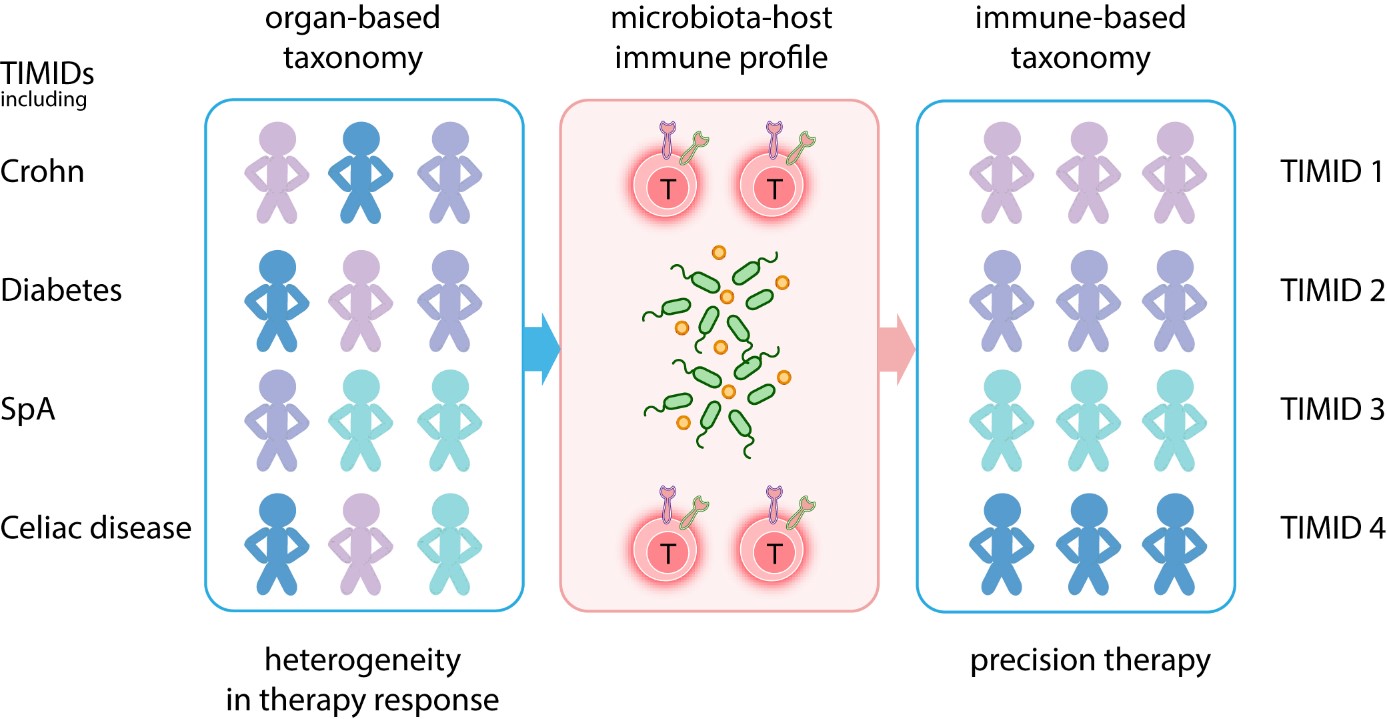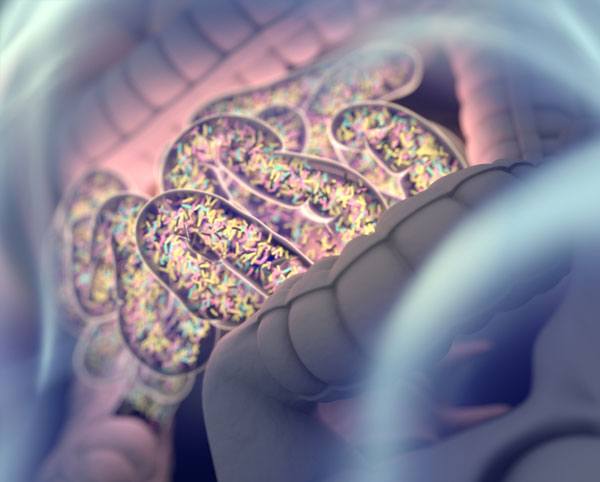Our immune system
TIMID focuses on aberrant immune responses that play a role in diseases such as type 1 diabetes, Crohn’s and Ulcerative Colitis, Spondylosing Arthritis, and the transplant rejection disease known as “graft vs. host disease”. The main problem of these immune-mediated inflammatory diseases (IMIDs) is that the disease can vary greatly from patient to patient and as a result is difficult to treat. There are strong indications that these IMID share common disease mechanisms. The TIMID research is aimed at making a new classification (taxonomy) of these inflammatory diseases on the basis of the immunological profile that arises from a certain aberrant immune response. By making a new classification, the researchers aim to find common denominators with which they can better predict which treatment works for which patient.
Graphic summary of the TIMID research project
_____________________________________________________________________

Our immune system protects us against pathogens such as bacteria and viruses. Once we have been in contact with a pathogen, we are protected, denoted as “immune”. This is the principle of vaccination. Our immune system also protects us from cancer caused by derailed tissue cells of our own body. Clearly, we cannot live without a properly functioning immune system. Sometimes the immune system makes a mistake and attacks our own body, which can have severe consequences. For example, in type 1 diabetes, the immune system aberrantly attacks the pancreas and in patients with rheumatism it attacks the joints. There are many other diseases in which derailment of the immune system plays a crucial role. In Celiac disease, for example, the immune system reacts against harmless gluten proteins, and in Crohn’s disease, dysregulated responses to intestinal microbes lead to chronic inflammation in the intestine.

Immune responses are also involved in the development and maintenance of various skin disorders, colon cancer and transplant rejection after stem cell transplantation. All of these diseases are therefore referred to as “immune mediated inflammatory diseases”, abbreviated as IMID. The major problem with IMID is that the disease can vary greatly from patient to patient and is therefore difficult to treat. Globally, the number of patients suffering from an IMID is significantly increasing. Our lifestyle may play a major role in this increase. Better hygiene and changes in eating habits have a major influence on the composition of our gut microbes. As long as the immune system and the intestinal microbes are in balance with each other, the intestinal tissue remains healthy. Disruption of this balance may lead to intestinal disease and modulate immune responses in other part of the body. Characterization of the intestinal microbial community in patients with IMID shows that they have a different composition of gut microbes compare to healthy individuals, even when their disease does not target the intestine. However, it is not clear whether this dysbalance between the immune system and intestinal microbes is a cause or an effect of IMID.
Purpose of the research and research questions:
In this study we hypothesize that aberrant interactions between the intestinal microbiota and the host immune system play an important role in IMID, irrespective of whether they affect the intestine or other parts of the body.
Therefore, the aim of our research is to decipher the profile of the immune response to intestinal microbes in IMID patients and classify patients to better predict how the disease will develop and possibly adapt therapeutic strategies.

In particular we will address the following questions for healthy individuals an patients with an IMID:
1. What is the composition of the immune system?
2. Which (inflammatory) mediators do the immune cells produce?
3. What are the interactions between the immune system and the intestinal microbes?
4. How can we restore a balanced immune system with immune modulatory treatments?
We anticipate that we can better classify the heterogeneity in IMID using the immunological profile independent of the organ in which the disease presents. This would allow us to treat patients in a much more targeted manner based the faulty immune response. Such targeted therapy should be more effective and may reduce treatment side effects. Our study focuses on T cells as these cells are a major driver of disease in a subgroup of IMID. We have denoted these diseases as “TIMID”. The following TIMIDs will be investigated: type 1 diabetes, colon cancer, celiac disease and Inflammatory Bowel Disease (Crohn’s and Ulcerative Colitis), joint diseases Juvenile idiopathic arthritis and Spondylosing Arthritis and graft versus host disease (transplant rejection disease).
The study conducted by the TIMID Consortium is led by Dr. Janneke Samsom (Erasmus MC) and Prof. Dr. Frits Koning (LUMC): “The unique aspect of our research is that we study the erroneous immune response in diseases, regardless of whether the disease affects the intestine, skin or joint. With this we hope to be able to better predict which treatment works for which patient” Samsom says.
For more information, check the links below:





